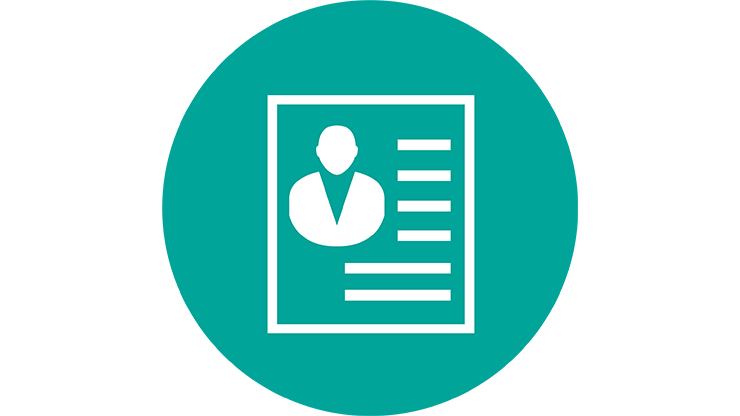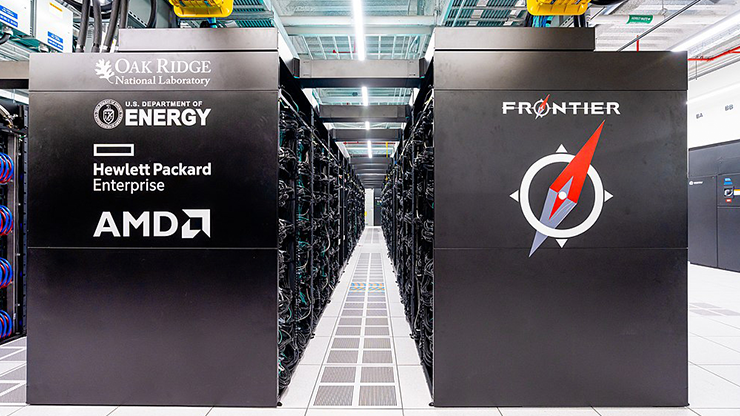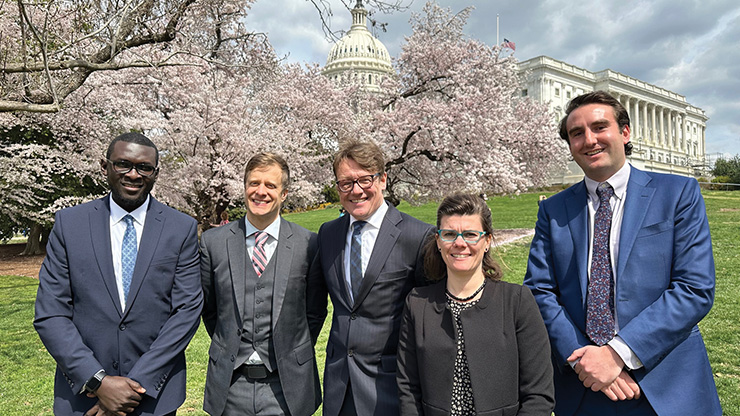From Theory to Advocacy: The SIAM Science Policy Fellowship Experience
Since its inception, the SIAM Science Policy Fellowship Program has offered postdoctoral researchers and early-career scientists a unique and invaluable opportunity to immerse themselves in the complex processes that shape scientific funding and influence key decisions in U.S. federal policy. Participants of this prestigious program gain a deeper understanding of the mechanics of policymaking while still pursuing their research and teaching commitments.
The Fellowship equips recipients with the necessary skills to effectively engage with federal officials and congressional staff. Science Policy Fellows take part in comprehensive training webinars about key budget considerations, legislative issues, and the appropriations process; meet with lawmakers, legislative staff, and federal agency officials in Washington, D.C.; physically attend the biannual spring and fall meetings of the SIAM Committee on Science Policy (CSP); and ultimately complete an independent policy project on a topic of their choice.
Each year, three to five Fellows are selected for this transformative, two-year experience that empowers them to represent the industrial and applied mathematics community and advocate for federal support in applied mathematics, computational science, and data science. Here, three SIAM Science Policy Fellows from the 2023 and 2024 cohorts share their personal journeys within the program, reflect on their newfound perspectives, and discuss their advocacy efforts for enhanced U.S. federal support in science, technology, engineering, and mathematics (STEM).
Bashir Mohammed, Intel Corporation
Five years ago, I was invited to represent Lawrence Berkeley National Laboratory at the International Year of the Periodic Table Elemental Slam on Capitol Hill, where I presented my work to U.S. legislators in Washington, D.C. This defining moment in my career offered a rare chance to interact with members of Congress and explore the intricacies of policymaking and scientific funding. Inspired by this experience, I began to actively seek other opportunities to connect with federal officials, expand my knowledge of science policy, better understand pivotal legislative matters in STEM, familiarize myself with the U.S. federal budget and appropriations processes, and advocate for applied mathematics and computational science in an impactful way. After applying for the SIAM Science Policy Fellowship Program, I was awarded the Fellowship in January 2023 alongside four other early-career researchers.

As a Science Policy Fellow, I participate in the biannual CSP meetings and promote applied mathematics research. The meetings, which take place in Washington, D.C., ensure that SIAM’s voice is part of the policymaking processes that influence scientific funding in the U.S. During my first CSP meeting in spring 2023, I engaged with senior SIAM members from various sectors, attended orientations about SIAM’s history with science policy, and participated in training sessions on federal budgeting and legislative advocacy. These events were guided by experts from Lewis-Burke Associates—SIAM’s governmental relations partner in Washington, D.C., that connects the Society with federal agencies and congressional offices—and provided valuable insights about effective strategies for communicating with policymakers. While in D.C., I even conversed with legislators and agency officials about budget allocations that significantly affect quantum and computational science. I also spoke with policymakers who support key initiatives like the National Quantum Initiative and the Department of Energy’s (DOE) Science for the Future Act — both of which closely align with my research interests.
In addition, I completed two policy projects over the last two years. In May 2023, I spoke about urgent priorities within the SIAM community at the White House Office of Science and Technology Policy Open Science Listening Session. Furthermore, I am privileged to be part of the steering committee for the upcoming 2024 SIAM Quantum Intersections Convening, which will take place from October 7-9 in Tysons, Va. This interactive three-day workshop will unite quantum-curious mathematical researchers with leading experts in quantum science to increase the visibility of applied mathematics in the quantum field.
My involvement with the SIAM Science Policy Fellowship Program has strengthened my commitment to advocacy and deepened my appreciation of science policy’s critical role in research funding. I look forward to continuing this work at the upcoming CSP meeting later this fall.
Victor Churchill, Trinity College
After completing my Ph.D. at Dartmouth College and a postdoctoral appointment at The Ohio State University (both R1 universities), I accepted a tenure-track position at Trinity College: a small liberal arts college in Hartford, Conn. The desirable offer from Trinity—a primarily undergraduate institution (PUI)—helped me realize that PUIs constitute promising career paths for recent graduates, especially since the growing number of applied mathematics and computational science Ph.D.s is far outpacing the stagnant number of available R1 tenure-track positions. However, certain challenges that are associated with smaller departments—such as additional responsibilities and a limited workforce (i.e., no graduate students)—make it harder for PUI educators to remain current and competitive in the research world. These challenges inspired me to apply for the SIAM Science Policy Fellowship. As a class of 2023 recipient, I have learned how to advocate for policies that will allow PUI faculty to further their own research while simultaneously training the nation’s future STEM workforce.
The Fellowship’s learning and networking opportunities have been especially invaluable to my personal goals. During the biannual CSP meetings, I absorb and connect with a figurative cornucopia of knowledge. Lewis-Burke lobbyists forecast budget and appropriations trends while leaders from federal agencies like the DOE, National Science Foundation (NSF), National Institutes of Health (NIH), and Department of Defense present their organizations’ respective visions, which the CSP then communicates to Congress. On the other side of the table, SIAM’s esteemed CSP members share nuanced insights and commentary that reflect their robust experience with research funding.
These meetings provide attendees with a remarkable sense of perspective on the relationship between science and government. In my case, I have observed a through line across agency priorities and committee discussions: the importance of training a STEM workforce that is globally competitive, particularly in foundational areas that support larger initiatives (such as artificial intelligence). Given the universality of this goal, CSP meetings also serve as a platform for bellwethers like me to call attention to disparities between the institutional focus on teaching and mentoring at PUIs and the dearth of research funding that is earmarked for these institutions.
Ultimately, my participation in the SIAM Science Policy Fellowship Program has spurred my own advocacy efforts in multiple ways. In fact, I hosted a minisymposium and panel about research funding at PUIs during the 2024 SIAM Annual Meeting, which took place in Spokane, Wash., this July. I am also creating a resource and funding guide for PUI faculty and communicating directly with funding agencies about the inclusion of more PUI faculty on review boards for PUI-specific funding opportunities. I look forward to continuing these efforts throughout my career.
Arielle Carr, Lehigh University

As a 2024 SIAM Science Policy Fellow, I have the unique opportunity to advance my professional interests in advocacy and promote diversity in STEM fields while simultaneously fulfilling my academic responsibilities at Lehigh University. Because external funding from federal agencies is essential in my position as an assistant professor, I must thoroughly understand the funding process to guarantee my own research sustainability. I am also passionate about diversity and seek to bolster the experiences of underrepresented groups—particularly women in applied math and computational science—and advocate for inclusive and equitable policy in the mathematical sciences. This Fellowship allows me to meaningfully connect my academic pursuits and desire to improve the cultural landscape in my field with federal lawmaking that dramatically impacts mathematical sciences research.
In May of this year, I visited the Washington, D.C., headquarters of Lewis-Burke Associates for a three-day workshop with CSP members and the other first- and second-year Fellows. On the first day of the workshop, an informative orientation with Lewis-Burke representatives equipped us with the necessary tools to communicate complex scientific ideas to non-expert audiences. The second day involved meetings with senior leadership from a variety of federal agencies, including the NSF, DOE, NIH, National Oceanic and Atmospheric Administration, and National Aeronautics and Space Administration; the delegates spoke about their current areas of interest and corresponding calls for funding. On the third and final day, we broke into smaller groups to converse with representatives from several congressional offices and advocate for continued funding in the mathematical sciences. These interactions strengthened my own advocacy skills and underscored the crucial role of persuasive communication in policy development.
Over the last year, I have learned that we must remain informed about legislative issues that affect the research and education communities, since these issues also impact the decision-making process for scientific funding. As I begin my second year of the SIAM Science Policy Fellowship Program, I look forward to developing and executing an independent policy project that promotes a proactive—rather than reactive—approach towards broader participation and workforce development in computational science and applied mathematics. I anticipate a continued fruitful collaboration with CSP members to ensure the thoughtful integration of scientific research into legislation that impacts society.
Conclusion and Call to Action
The SIAM Science Policy Fellowship Program is an exceptional opportunity for early-career researchers and postdoctoral appointees to gain invaluable experience at the intersection of science and federal policy. The firsthand accounts of current Fellows demonstrate the program’s profound ability to influence policy discussions, champion the future of scientific research, amplify scientific voices, and ultimately drive change. We strongly encourage all interested candidates to apply for the Fellowship and join a growing network of scientists who are dedicated to shaping the future of U.S. science policy.
The application deadline for the next round of Fellowship recipients is November 1, 2024. To be eligible for consideration, successful applicants must be SIAM members in good standing, work and live in the U.S., be passionate about public policy, possess strong communication skills, and be willing and able to travel to Washington, D.C., twice a year. Applications should include a CV/resume, a candidate statement, and an issue statement about a relevant policy topic of the applicant’s choice. Selected Fellows will serve a two-year term that includes training sessions, attendance at CSP meetings, communication with federal officials, and participation in an advocacy day on Capitol Hill in Washington, D.C. To learn more about the Fellowship and submit your application, visit the program’s webpage.
About the Authors
Bashir Mohammed
Senior Staff AI Architect, Intel
Bashir Mohammed is a Senior Staff AI Architect in Intel’s Network and Edge Group, where he drives pioneering innovations in artificial intelligence (AI) for the Edge Platform. His work focuses on the development and deployment of large language models, large vision models, and AI reasoning and action agentic frameworks. These efforts deliver transformative solutions across diverse industries to enhance the efficiency, scalability, and intelligence of edge applications.
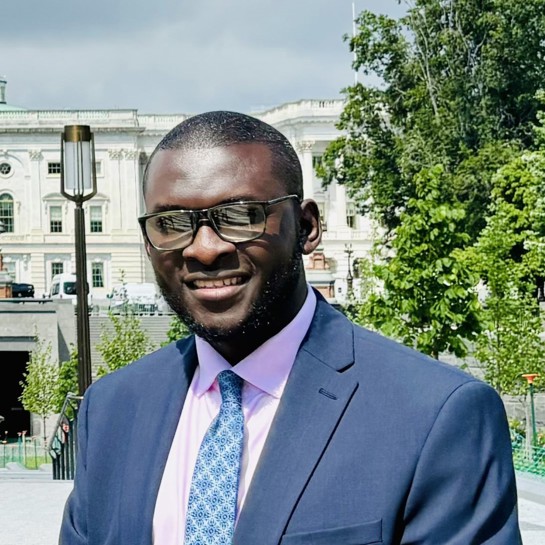
Victor Churchill
Assistant professor, Trinity College
Victor Churchill is an assistant professor in the Department of Mathematics at Trinity College and a 2023-2024 SIAM Science Policy Fellow. His research interests include scientific machine learning and inverse problems in imaging, while his policy interests focus on issues that pertain to faculty and students at primarily undergraduate institutions.
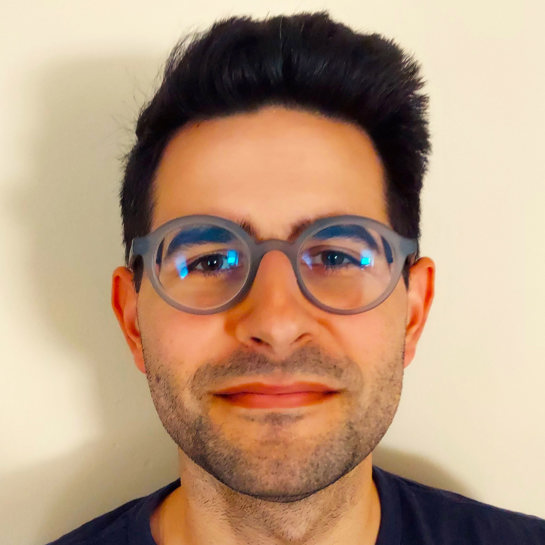
Arielle Carr
Assistant professor, Lehigh University
Arielle Carr is an assistant professor in the Department of Computer Science and Engineering at Lehigh University. She uses techniques such as Krylov subspace recycling and preconditioner updates to develop novel and innovative iterative methods that solve large-scale linear systems and eigenvalue problems to enhance solver efficiency.
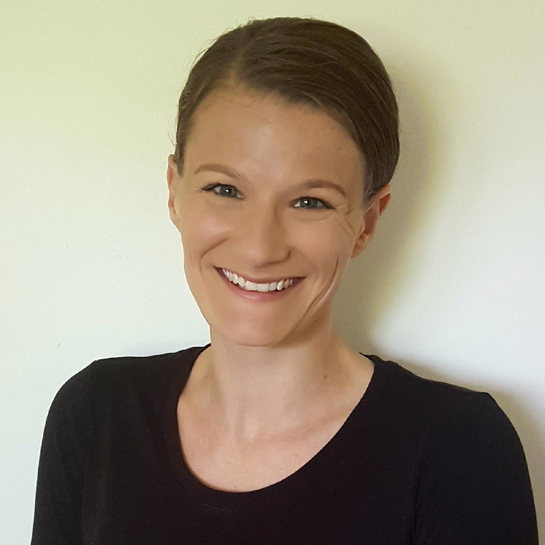
Stay Up-to-Date with Email Alerts
Sign up for our monthly newsletter and emails about other topics of your choosing.



